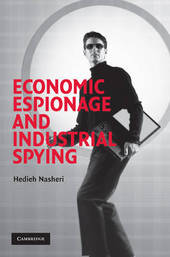
|
Economic Espionage and Industrial Spying
Paperback / softback
Main Details
| Title |
Economic Espionage and Industrial Spying
|
| Authors and Contributors |
By (author) Hedieh Nasheri
|
| Series | Cambridge Studies in Criminology |
|---|
| Physical Properties |
| Format:Paperback / softback | | Pages:288 | | Dimensions(mm): Height 226,Width 150 |
|
| ISBN/Barcode |
9780521543712
|
| Classifications | Dewey:364.168 |
|---|
| Audience | | Tertiary Education (US: College) | |
|---|
| Illustrations |
Worked examples or Exercises
|
|
Publishing Details |
| Publisher |
Cambridge University Press
|
| Imprint |
Cambridge University Press
|
| Publication Date |
6 December 2004 |
| Publication Country |
United Kingdom
|
Description
This book provides an analytic overview and assessment of the changing nature of crime in the burgeoning information society. Bringing together views from leading national and international authorities, Hedieh Nasheri explains the historical and theoretical background surrounding issues of economic espionage, trade secret theft and industrial spying and its impact on society. She looks at legislative history, the progression of electronic and corporate criminal behavior by introducing the concept of information theft and computer crimes, exploring its definition, its identification and its development within criminology. Nasheri presents an assessment of the state of economic espionage activities within a criminological context and based on that assessment addresses areas where additional action is required. The book also draws attention to a variety of issues raised by economic espionage and technological development. It draws on a variety of disciplines, including criminology, criminal justice, sociology, law and society, economics and political science.
Reviews"We criminologists and academic criminal lawyers have been slow to turn our attention to non-traditional crimes and criminals, thereby missing extraordinarily important developments. Hedieh N asheri has given us a wake up call. Her work on theft of intellectual property should be incorporated into our courses and research agendas." James. B. Jacobs, Warren E. Burger Professor of Law, NYU School of Law
|